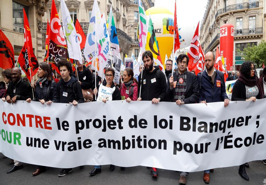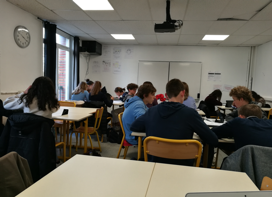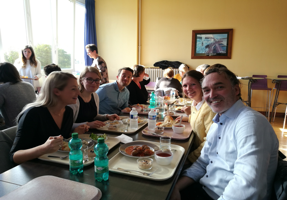Follow us:
Email:post@ryenbergetskole.no
THEME-BASED-EDUCATON.EU
RYENBERGET SCHOOL - NORWAY
Institution
St Joseph
Private Catholic middle and secondary school with partial immersion options for European and Oriental languages.
« We strive to provide a welcoming atmosphere for all students, where they will find the programme of study that is just right for them.
Our programmes ensure that students are treated as individuals and are supported throughout their schooling by our clearly identified lead teachers. The result is an on-going relationship between students, families and teachers ».
Guillaume DEMEILLERS
Headmaster
Le Havre
About Institution Saint Joseph:
Institution Saint Joseph is a semi private school in Normandy, Le Havre. That means the school is owned by the Catholic Church but the teachers are paid by the French state. We had been recommended to contact Institution Saint Joseph by the Erasmus + office in Normandy (Rouen) to see their high focus on international work.There are approx. 2300 students at the school and approx.160 teachers. In the mercantile staff there are approx. 70 people.
These are their classes:
- Class 6e were students in college who were approx. 11 years old.
- Class 5e were students in college who were approx. 12 years old.
- Class 4e were students in college who were approx. 13 years old.
- Class 3e were students in college who were approx. 14 years old.
- Class 2de were students in high school/lycée who were approx. 15 years old.
- Class 1ère were students in high school/lycée who were approx. 16 years old.
- Class Terminal were students in high school/lycée who were approx. 17 years old.
The principal was internationally oriented. He demanded a reform toward sustainable development, consequently leading to a big international focus and a lot of European and International projects. The school had international students from 19 countries (Oceania, Asia, Africa, Europe etc.). They offered 1 international section, 4 European sections, 1 oriental section and they offered teaching in 9 foreign languages. The principal visited approx. 3-4 countries each year to follow up the international work and the school had also 2 international coordinators to administrate the work.
Program, “Job Shadow” November 6:
- 0930: We meet our contact person at Institution Saint Joseph.
- 1010 - 1105: “Job Shadow” in “middle school” and “high school”. We attended English classes.
- 1105 – 1200: “Job Shadow” in “high school”. We attended English classes.
- 1300: Lunch in the city of Le Havre.
- 1430 Summary of the day at the hotel.
- Program afternoon: We explored Le Havre.
- Kl 2000: Dinner in the city of Le Havre.
Program, “Job Shadow” November 07:
- 0800 – 0855: “Job Shadow” in “high school”. We attended Geography and History classes.
- 0855 – 0950: “Job Shadow” in “middle school”. We attended British literature classes.
- 1010 – 1105: “Job Shadow” in “middle school” and “high school”. We attended British literature, Geography and History classes
- Lunch at Institution Saint Joseph.
- 1200 – 1230: Summary of the day.
- We arranged an excursion and visited Normandy and Omaha beach and the Museum of D Day (World War 2).
- Kl 2000: Dinner in the city of Honfleur.
Program, “Job Shadow” November 08:
- 1010 – 1105: “Job Shadow” in “middle school” and “high school”. We attended British literature classes.
- 1105 – 1200: “Job Shadow” in “middle school” and “high school”. We attended History and Biology classes.
- Lunch at Institution Saint Joseph
- 1300 – 1425: “Job Shadow” in “high school”. We attended British literature classes.
- 1425 – 1520: “Job Shadow” in “term international section”. We attended British literature classes.
- 1700: Summary from the days at Institution Saint Joseph. Distribution of tasks for report and presentation to staff at Ryenberget school.
- 2000: Dinner in the city of Le Havre.
Experiences from the “Job Shadow”:
New French reform: “No kid left behind” Macron (2018)
Macron introduced a new French reform for the development of the French school. This reform emphasizes that school owners must be more free in the organization of teaching. This means that the national guidelines become more general and that the school has more possibilities to adapt the methodology at its own institution. The reform also reduces the number of competency goals in the curricula so the students have more time to work in-depth with each topic. It also focuses on a didactic change to more focus on group work with reflections and discussions, versus previous factual knowledge and individual work.
Other areas of focus are how the teacher must be given a greater responsibility as a role model for the students. There is also a focus on smaller classrooms, a ban on cell phones in the classroom, and compulsory schooling for children from the age of 3 years old.
“In – Depth learning” and multidisciplinary collaboration:
It was exciting to see how the Norwegian focus on “in-depth learning” in our new curriculum had a parallel in the French reform. We also observed how this reform had changed practices and already left imprint in the classroom at Institution Saint Joseph. We interviewed teachers who could show that the curriculum had fewer and more general goals. One could tell that it had now been reduced to 4 major overall goals in her curriculum, where the teacher herself could choose the topics the teacher found most important according to the main goal. This gave the teacher more time to work in depth compared to previous practice.
We also saw in practice how the teaching in several classes was organized in groups. The teachers told us that this was not always perceived as positive by the students. Nevertheless, they meant it would take some time before they could see the benefits of this methodical way of working on reflections and discussions.
One example:
We attended an English class for 2de. The teacher explained to us how the curriculum was divided into 4 main topics. The teacher also explained how she selected 2 topics related to each main area and “included” grammar, speaking and writing-skills development, and cultural knowledge into this theme. In this particular class the teacher had chosen the theme “Do we live in Dystopia?”. The session included infographics, text-excerpts, tasks were presented and given to the students at the beginning of class. Next, they were divided in groups where they had to prepare answers for a summary in plenary.
When it comes to interdisciplinary collaboration, the teachers did not have time in their schedules and places/offices at the school were this could be planed. We did not get the impression that this way of working had a big focus in the organization. But there were examples of this being started, as a drama project we were told about.
Class management:
In general, we experienced that the student shoved great respect toward their teachers. They kept good control in their classes, but there was also some chatter accepted. However, the teachers expected more of their students in relation to keeping track of information and tasks etc. than we are used to in Norway. A great responsibility was given to the pupils regarding their learning situation. The pupils were themselves responsible for acquiring the knowledge while the teacher was more like a mentor and subject facilitor.
Students often had presentations from the board on assignments they had been working on. Then came quite concrete and direct feedback from the teacher about the content and performance skills of the individual student. At the end of each class, everyone was told to bring out their diary. There they had to write down what to work on at home and what was expected of them.
At the same time, there was great freedom in the lessons and good relations between teachers and students. We experienced quite good classroom management and a good learning situation.
The use of ICT as a methodical tool for pedagogical work:
We observed little use of ICT as a methodical tool in the classroom. We asked the principal why, and he argued that ICT tools largely take the focus away from the subject and onto the ICT tool itself. He was not against the use of ICT, but then the teacher needed a good reason. The positive effects we saw were that little time was spent on ICT technical problems. It was also an effect that all students had to write by hand and developed a nice handwriting.
At the same time the new school reform has a focus on algorithms already from 4th grade. There will be a focus on computer science in the middle school, and there are focuses on France becoming a hub for innovation. For example, in high school students learn about cryptocurrency. All this will probably push forward a bigger use of ICT as a methodological tool. We experienced that they had a computer room that could accommodate 2300 students in a booking system, and one ICT staff to serve this group. At the same time, we got to participate in 2 classes where they had the use of iPad as a trial project. These were often used to google up topics that were on the syllabus.
Sum-up:
It was inspirational for us to visit Institution Saint Joseph. We got a good insight into several of our topics in France and we
Widened our perspectives. Experiencing the teaching situation in practice in another country gives us many new impressions and ideas regarding our own practice. One example is the effect we noticed about how students did not use books but were given paper of the topic at the beginning of the lesson. These were then collected again at the end of the class. All this we want to bring back to our own organization and it will be taken into consideration when we design future practice and educational work.
We would like to thank our hosts for welcoming us and creating a detailed and versatile program for these 3 days. We also hope we can continue to have contact and exchange experience in our new international network.



.jpg?etag=%2281739-5de76fa0%22&sourceContentType=image%2Fjpeg&ignoreAspectRatio&resize=400%2B317&extract=0%2B0%2B400%2B282&quality=85)



.jpg?etag=%221a38b3-5de77314%22&sourceContentType=image%2Fjpeg&ignoreAspectRatio&resize=267%2B200&extract=0%2B0%2B267%2B200&quality=85)
















